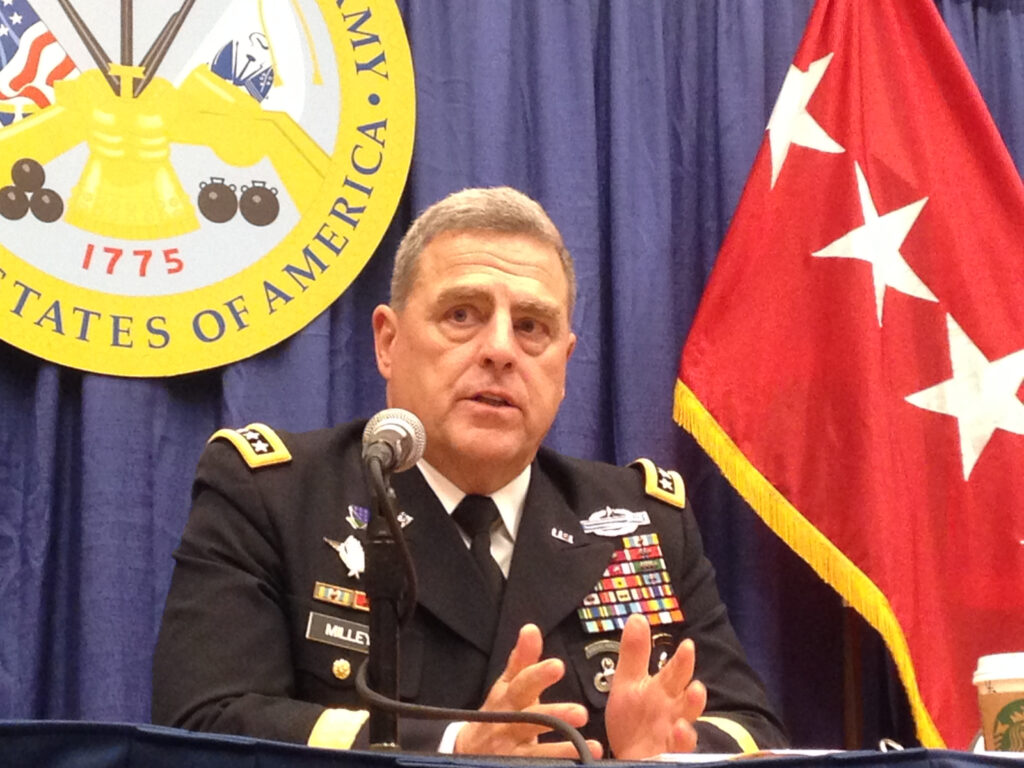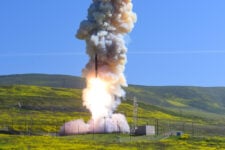
Gen. Mark Milley
WASHINGTON: Who is Army Gen. Mark Milley? A lot of the Washington sources we rely on didn’t know him. But the administration’s choice for a new Army Chief of Staff is a “soldier’s soldier” who’s spent more time in Afghanistan than inside the Beltway.
Proven warriors don’t always do well in DC: Budget battles require different tactics and temperaments. At first glance, Gen. Milley comes across as a big brusque bear of a man, and he can be one — but he’s also well-read, a good listener, and unusually thoughtful, say those who know him.
Those who know him, though, are a distinct minority in defense policy circles. (Although Milley is well-known to Army Secretary John McHugh, having commanded Fort Drum in the former congressman’s home district). It’s worth hammering home what a dark horse Milley is, at least from a DC insider’s perspective. I personally have met him once in 17 years of covering the military, so when Defense Secretary Ash Carter named him this afternoon, I went scrambling to my sources. What struck both me and Colin was how few of the best-informed people on Army issues knew anything about Mark Milley. And these are just the ones who’d let me quote them:
“I don’t know him at all,” said one Hill staffer.
“I do not know him well,” said a retired general now with a major trade association.
“I do not know him,” said a thinktanker with long experience of the Army. “It’s a big surprise to me.”
“The nomination really surprised my colleagues and me,” said an Army civilian. “I had to Google ‘Gen. Milley.'”
“I do know Mark Milley. He’s a great guy,” said Maren Leed.
Then I won’t bother you anym — wait, you know him?
“He was on the Joint Staff while I was on the Joint Staff,” said Leed, who’s now a senior adviser at the Center for Strategic and International Studies. “I personally think he’s a terrific choice.”
“Anybody who knows him will say he is a soldier’s soldier, absolutely the best of the Army today,” Leed told me. “He’s a no-bullshit, get-stuff-done kind of guy, who cares about people and wants to do the right thing.”
“He comes across as a tough guy — and he is,” she said. “He’s physically imposing, he’s brusque, [and] he seems like he’s going to break your neck whenever he sees you, but he’s not.”
“I’ve never seen him break anyone’s neck,” Leed continued thoughtfully, “but I know if I ever needed somebody’s neck broken — and they deserved it — he’s the guy.”
So how on earth will this big tough guy execute the delicate kabuki dance of policy in Washington, DC? “General Smith comes to Washington” might make a good movie, pitting Pattonesque guts and glory against slimy politicos and greasy bureaucrats. But straight-shooting soldiers haven’t always served the Army well as chief of staff. Eric Shinseki’s honesty on how many troops were needed to occupy Iraq only brought him grief under Donald Rumsfeld, as did his politically tone-deaf push for wheeled vehicles and black berets. Peter Schoomaker, his successor, was a special operations soldier — much like Milley — who struggled to adjust to the “Big Army.”
Don’t worry, said Leed. True, “he is like many army chiefs, not having spent a lot of time in the Pentagon. They don’t tend to pick chiefs like that,” she acknowledged. But he did serve on the staff of Bob Gates, the now-legendary Defense Secretary who (among many other things) canceled the Army’s largest program. Milley had to navigate chronic friction between the SecDef and the Army leadership, playing what Leed called “a translation and mediation role.” The often insular Army has long struggled to understand and make itself understood by outsiders, including — perhaps especially — the Office of the Secretary of Defense, and Milley has experience bridging those gaps.
“Mark Milley is a very direct person,” Leed said. He calls things like he sees ’em and he does not mince words — but he’s got a sophisticated understanding of how the world works, so he’s not naïve…. He pays attention and he has an open mind.”
Leed is not alone in her assessment. “As a retail-level leader he was very good and clearly thoughtful,” said one Army officer who’d served under Milley in Afghanistan. “He was head and shoulders above his peers in understanding the larger political struggle, but shares in the institutional failure to prioritize the development of Afghan capacity over US-led targeting efforts.”
A Hill staffer who’d met Milley in Afghanistan agreed. “He came across as very well informed and as someone who’d thought about the situation he was dealing with in Afghanistan quite a lot and fairly deeply….He seemed to be a smart, informed, forceful commander.”
The question is whether a mind that could grasp Afghanistan can manage the treacherous world of Washington.
Move over FARA: General Atomics pitching new Gray Eagle version for armed scout mission
General Atomics will also showcase its Mojave demonstrator for the first time during the Army Aviation Association of America conference in Denver, a company spokesman said.


























